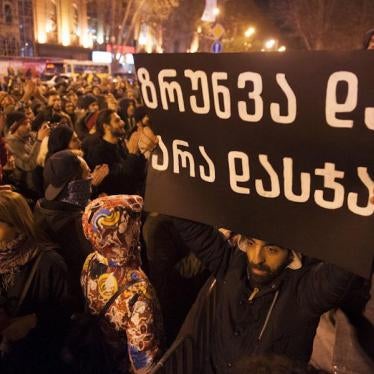Update: On March 7, the parliament adopted one of the two bills in first reading, prompting more massive protests. On March 9, the ruling party announced that they were withdrawing the bills, citing their failures to explain to the public the perceived need for the law. The authorities should ensure that the bills do not return in any form and guarantee a safe and enabling environment for civil society in Georgia.
(Berlin) – Georgia’s parliament should firmly reject the two bills it is debating that would require individuals, civil society organizations, and media outlets to register with the Justice Ministry as “agents of foreign influence” if they receive at least 20 percent of their funds from abroad, Human Rights Watch and Amnesty International said today. If adopted, the bills would also impose additional onerous reporting requirements, inspections, and administrative and criminal liability, including up to five years in prison for violations.
These bills are incompatible with international human rights law and standards that protect the rights to freedom of expression and association.
“The ‘foreign agent’ bills seek to marginalize and discredit independent, foreign-funded groups and media that serve the wider public interest in Georgia,” said Hugh Williamson, Europe and Central Asia director at Human Rights Watch. “They clearly aim to restrict critical groups and crucial media, violate Georgia’s international obligations, and would have a serious chilling effect on groups and individuals working to protect human rights, democracy, and the rule of law.”
At a joint session of the parliamentary committees to review the bills on March 2, 2023, there were verbal and physical confrontations between members of parliament from the ruling party and opposition parties. There were also peaceful protests against the bills outside the parliament building, resulting in the arrest of 36 people. They were charged with administrative infractions of hooliganism and police disobedience, and later released. Twenty-two people face trials on administrative charges.
On February 14, a faction in the parliament formed by the members who left the ruling Georgian Dream party but remained in the parliamentary majority, proposed the On Transparency of Foreign Influence bill, which requires nongovernmental groups, and print, online and broadcast media that receive 20 percent or more of their annual revenue – either financial support or in-kind contributions – from a “foreign power” to register as “agents of foreign influence” with the Justice Ministry. The bill defines “foreign powers” as foreign government agencies, foreign citizens, legal entities not established under Georgian legislation, and foundations, associations, companies, unions and other organizations or associations under international law.
Organizations and media outlets registered as an “agent of foreign influence” would be obliged to submit an electronic financial declaration, including full data on the source, amount, and purpose of any money and other material benefits received and spent. This duplicates some reporting obligations to tax and other agencies, and would further put at risk the privacy of those related to the association. The Justice Ministry would be authorized to investigate and request and study additional information, including personal data. The proponents of the bill have not explained how this duplicative and onerous reporting increases transparency or accountability, but rather appears to be a blatant effort to restrict the ability of associations and media to operate freely and independently, and stigmatize independent groups, Human Rights Watch and Amnesty International said.
The draft bill imposes a fine of GEL 25,000 (US$ 9,600) for evasion of registration or failure to submit the full financial declaration.
On February 22, the same members of parliament registered another version of the bill, which expands the scope of “agents of foreign influence” to include individuals and increases the penalties for failure to comply from fines to up to five years in prison. The bill says that a physical individual or a legal person, on the basis of the “interests of foreign force,” would be considered an “agent” of a “foreign power” if they: participate in ongoing political activities in Georgia; act as a public relations adviser, advertising agent, employee of a news service, or political adviser; or finance various organizations in Georgia, lend money or other property, and represent the interests of a foreign power in Georgia in relations with state bodies. Many of these vague concepts, including “political activities,” are not clearly defined in law and could further restrict the right to freedom of association.
On February 27, the parliamentary bureau decided to send both bills to the relevant committees for consideration. The ruling Georgian Dream party expressed public support for the bills.
The bills have triggered strong criticism from Georgian civil society groups, multilateral organizations, and bilateral partners. In a joint statement, about 400 local nongovernmental groups and media outlets said that the adoption of the bill would amount to “an attack on the core Georgian values of dignity, independence and solidarity” and would harm the people of Georgia.
The United Nations in Georgia expressed “profound concern” on February 26, noting that, if adopted, the law “is likely to impede the work of the UN to implement” its sustainable development program. The US and EU ambassadors, the spokespersons for the EU high representative, Josep Borrell, and the US State Department have also criticized the bill, saying that it is incompatible with Georgia’s Euro-Atlantic aspirations. In a February 28 open letter, the Council of Europe human rights commissioner, Dunja Mijatović, said that the law could have a serious chilling effect on the work of civil society organizations in Georgia.
President Salome Zurabishvili said that she would veto the law, as she “cannot support such legislation and persecution of new agents.”
The ruling party, which has the parliamentary majority to overcome the veto, claims that the bill aims merely to ensure the transparency of nongovernmental organizations and media outlets. The bill’s supporters have invoked alleged similarity to the US Foreign Agent Registration Act (FARA), and its authors state that the second version of the bill is a direct translation of FARA.
Civil society organizations have condemned this comparison as disingenuous and misleading as the US law primarily regulates lobbyists and does not serve as a mechanism for weakening civil society organizations and media. It also does not equate receiving foreign funding, in part or in whole, with being under the direction and control of a foreign principal. Various statements by the bill’s initiators and the ruling party leaders, which have been increasingly critical of civil society organizations and media outlets supporting the opposition in the country, strongly suggest that, if adopted, the authorities would weaponize this law to further stigmatize and penalize independent groups and media outlets that are critical of the government.
The leader of the Georgian Dream party, which anchors the ruling parliamentary coalition, said in an interview with the progovernment TV Imedi on March 2 that the bill would have a “preventive effect” in dealing with the “radical opposition and CSOs [civil society organizations] affiliated with it,” and that, as a result, “donors would abstain from financing polarization.”
The ruling coalition considers groups that challenge government decisions as “radical” and accuses them of unilaterally fueling polarization in the country. Statements like these send a chilling message to state critics, who may be deterred from freely expressing their opinions for fear of reprisals.
The draft laws contradict Georgia’s obligations under the European Convention on Human Rights and the International Covenant on Civil and Political Rights (ICCPR), to which Georgia is a party. While certain limitations of the rights to freedom of expression and association are permissible under international law, they must be provided by a clear and accessible law, and be necessary and proportionate to a legitimate aim. The current bills do not meet this test, Human Rights Watch and Amnesty International said, and would impose undue restrictions on these rights.
The right to seek, receive and utilize resources from national, international, and foreign sources is an inherent part of the right to freedom of association. This has been established by numerous international and regional human rights mechanisms, including the Committee of Ministers of the Council of Europe in its 2007 recommendation “on the legal status of nongovernmental organizations in Europe.”
In 2022, the European Court of Human Rights found Russia’s “foreign agents” law, which is similar to the Georgian drafts, in violation of Article 11 of the European Convention protecting the right to association. The court ruled that creating a special status and legal regime for organizations that receive funding from international or foreign sources was not justified, and that restrictions interfered with their legitimate functions.
“The proposed draft bills trample on the rights of freedom of expression and association, and run counter to Georgia’s human rights obligations and therefore should never be adopted,” said Marie Struthers, Amnesty International's director for Eastern Europe and Central Asia. “Instead of passing bills that would clearly impede the work of independent voices that the government doesn’t like, the authorities should be discussing ways to guarantee a safe and enabling environment for civil society.”






